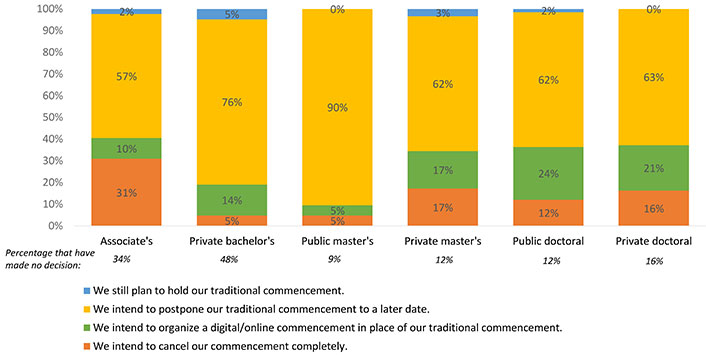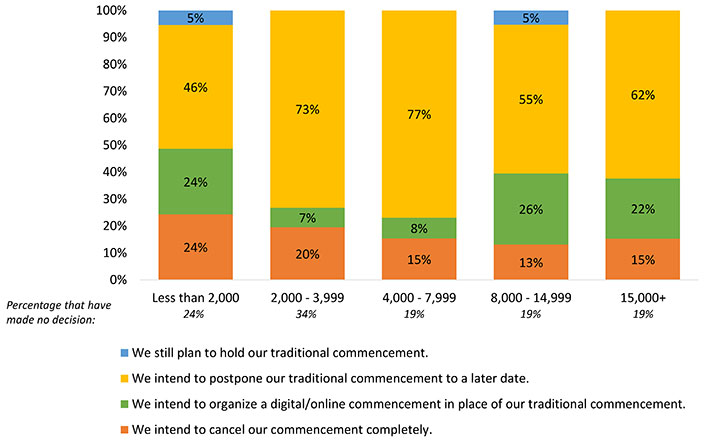Traditional commencement gatherings may not be possible in 2020, considering the social distancing practices that have been put into place around COVID-19. Campus leaders are exploring alternatives to these cherished convocation ceremonies.

As the COVID-19 pandemic upends higher education in 2020, institutions are relying on digital alternatives to missions, activities, and operations. Challenges abound. EDUCAUSE is helping institutional leaders, IT professionals, and other staff address their pressing challenges by sharing existing data and gathering new data from the higher education community. This report is based on an EDUCAUSE QuickPoll. QuickPolls enable us to rapidly gather, analyze, and share input from our community about specific emerging topics.1
The Challenge
Commencement—the time-honored celebration of degree and credential attainment and academic honors—brings students, their friends and family, faculty, and others to higher education campuses. But such gatherings may not be possible, considering the social distancing practices that have been put into place to contain and slow the spread of COVID-19. With less than two months remaining until many institutions hold their traditional commencement ceremonies, leaders are exploring alternatives to these cherished convocation ceremonies.
The Bottom Line
More than three-fourths of colleges and universities responding to this QuickPoll have made commencement decisions.2 Of those, most are postponing the ceremony. Some institutions are planning a digital commencement instead of the traditional commencement, whereas others are canceling commencement completely. The other one-fourth are still deciding what to do.
The Data
Many higher education institutions are postponing commencement. Currently, about half of the 315 respondents to the EDUCAUSE March 26 QuickPoll plan to postpone their commencement ceremonies (see table 1). Almost one in four haven't decided what to do yet. The remaining institutions are about evenly split between canceling commencement altogether and moving the ceremonies online.
Table 1. Commencement Plans
|
How have your institution's commencement plans changed in response to the COVID-19 pandemic? |
Percentage of institutions |
|---|---|
|
49% |
|
23% |
|
14% |
|
13% |
|
1% |
Commencement plans vary based on Carnegie class (see figure 1) and institution size (see figure 2). Most master's and doctoral institutions have made a decision, and for most of them, their decision is postponement. About half of bachelor's and a third of associate's institutions haven't decided what to do yet. The institutions most likely to hold a digital commencement are the very smallest (less than 2,000 FTE) and largest (8,000 and more FTE) institutions and doctoral institutions.


Most higher education institutions have announced their plans, but details are still undetermined. Three-quarters of institutions have shared at least some information about commencement with institutional constituents (see table 2). Only 7% have provided detailed information.
Table 2. Commencement Plans
|
How much information about the changes to commencement have you shared with institutional constituents so far? |
Percentage of institutions |
|---|---|
|
55% |
|
25% |
|
13% |
|
7% |
Higher education institutions are defining what an online commencement is. Respondents at thirty-six institutions shared information about how they are planning to offer at least a partially digital commencement (see table 3). Most plan to include commencement speakers, and many will be awarding diplomas individually.
Table 3. Online Commencement Plans
|
What aspects of your traditional commencement is your institution considering or planning to offer digitally or online? |
Percentage of institutions |
|---|---|
|
64% |
|
42% |
|
36% |
|
14% |
|
11% |
|
8% |
Higher education institutions still have logistics to work through. Respondents at seventeen institutions provided information about their biggest unresolved challenge so far. Most are working through logistical and technical details. Three expressed concerns about students' reactions to potential changes.
Poll question: What is your biggest unresolved challenge regarding your 2020 commencement (e.g., bandwidth, accessibility of the tools, logistics)?
- Accessibility
- Making sure the students are in agreement with us on what we do
- Students do not like the idea.
- Engaging the students
- Time
- Time and coordination of recordings
- How to host in-person recognition at a later date
- Logistics
- Logistics
- Logistics
- Organizing guest speakers
- The challenge is not about hardware/software/bandwidth; it is the process of how to do it (e.g., the walking, who's live versus at home).
- Bandwidth; cancellation of current paid vendors; logistics
- Determining a tool to encourage engagement with students and their families
- Internet access for students
- The unknown unknowns
- We're still in a very early planning stage. We'll be polling students about possible onsite dates, potentially as early as late summer, and also working on virtual events to celebrate graduating students.
Promising Practices
The institutions with plans to offer some online version of commencement and those with other firm plans offered details that might help guide the many college and university leaders who are still trying to decide what to do.
Several institutions are planning to blend online and face-to-face commencement activities:
- We intend to postpone our traditional commencement to a later date. We intend to organize a digital/online commencement in place of our traditional commencement.
- We've told our students they can come back for our 2021 commencement. Online plans for this year are still forthcoming.
- We have to cancel. We may allow students who would have walked in May to walk in our December commencement. We are planning some form of student celebration but haven't resolved exactly what that will be.
- We are producing an online video with pre-reviewed 30-second videos from students in their cap and gown as well as the grad speaker, etc. We are also adding a "drive down memory lane" experience so that they can visit campus in a safe manner with their family, staying in the car (except for various photo opportunities).
- We're aiming to do a combination of an onsite event at a later date and virtual celebration events. We have not discussed vendor products yet.
Digital celebrations will include pre-recorded and live elements:
- Simultaneous reading of names and digital scrolling on screen of names
- Addresses from the president and the scheduled guest speaker; reading of graduates' names (possibly with submitted photos) and (verbal) conferral of degrees by the president and the board chair; probably pre-recorded rather than live
- Most likely a pre-produced video with an abbreviated commencement address and then the awarding and conferring of degrees using students' photos; the board chair, president, dean, and secretary of faculty each doing their roles in pre-recorded segments
- A short film as part of the messaging
- Preliminary: pre-record university leadership elements; release our set date/time; invite social-media-hosted viewing parties
- Scripted speakers, song leader, nomenclature reading names while names scroll on screen
Respondents from two institutions offered links to learn more about their commencement activities:
- https://thenextweb.com/virtual-reality/2020/02/24/purdue-offers-online-students-vr-graduation-ceremony/
- Because we knew it was unlikely we'd be able to hold our usual commencement, students organized a "Faux-mencement" right before they left campus. It meant a lot to the students and the Olin community. Check out the video—including our rush to make gowns out of trash bags and caps from origami paper! [http://www.olin.edu/news-events/2020/40-hours-time-olin-students-plan-hold-faux-mencement-ceremony/]
Some respondents mentioned the tools they plan to use:
- We will use Canvas and Zoom. All staff have had week three of the first semester to shift all material online.
- We will use Zoom to broadcast. It will be a live event, possibly with some pre-recorded information.
- We have considered only the tools we already have in our virtual campus.
- We will contract with a company that does online commencement for online universities.
- We will use MarchingOrder.
- We plan to use MarchingOrder and are finalizing details.
Graduation season is almost upon us. As higher education institutions scramble to make commencements meaningful and memorable during the COVID-19 pandemic, many have chosen to postpone, others are pivoting to digital celebrations or have canceled ceremonies, and still others have not yet made a decision.
EDUCAUSE will continue to monitor higher education and technology related issues during the course of the COVID-19 pandemic. For additional resources, please visit the EDUCAUSE COVID-19 web page. All QuickPoll results can be found on the EDUCAUSE QuickPolls web page.
For more information and analysis about higher education IT research and data, please visit the EDUCAUSE Review Data Bytes blog as well as the EDUCAUSE Center for Analysis and Research.
Notes
- QuickPolls are less formal than EDUCAUSE survey research. They gather data in a single day instead of over several weeks, are distributed by EDUCAUSE staff to relevant EDUCAUSE Community Groups rather than via our enterprise survey infrastructure, and do not enable us to associate responses with specific institutions. ↩
- The poll was conducted on March 26, 2020. Respondents represented 323 institutions, with sufficient data provided for 315. The poll consisted of eight questions and took most respondents less than two minutes to complete. Poll invitations were sent to participants in EDUCAUSE community groups, including the CIO, Women in IT, LAT (leading academic transformation), and Community College groups. Most respondents (298) represented US institutions. Other participating countries included Australia, Canada, Colombia, Finland, Germany, Mexico, Saint Lucia, and the United Kingdom. An appropriately diverse range of institution sizes and Carnegie classifications participated. ↩
Susan Grajek is Vice President of Communities and Research at EDUCAUSE.
© 2020 Susan Grajek. The text of this work is licensed under a Creative Commons BY-NC-ND 4.0 International License.
